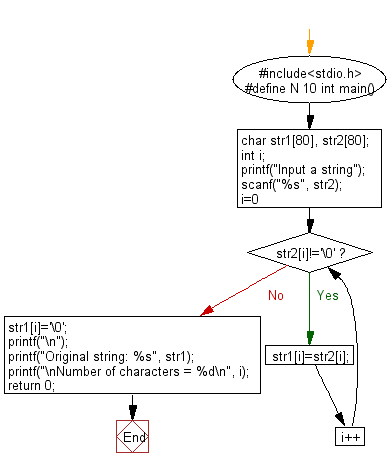C Exercises: Copy a given string into another and count the number of characters copied
C Basic Declarations and Expressions: Exercise-71 with Solution
Write a C program to copy a given string into another and count the number of characters copied.
Pictorial Presentation:

Sample Solution:
C Code:
#include<stdio.h>
#define N 10
int main()
{
char str1[80], str2[80];
int i;
printf("Input a string");
scanf("%s", str2);
for(i=0; str2[i]!='\0'; i++)
str1[i]=str2[i];
str1[i]='\0';
printf("\n");
printf("Original string: %s", str1);
printf("\nNumber of characters = %d\n", i);
return 0;
}
Sample Output:
Input a string Original string: w3resource Number of characters = 10
Flowchart:

C programming Code Editor:
Contribute your code and comments through Disqus.
Previous:Write a C program to print the alphabet set in decimal and character form.
Next: Write a C program to remove any negative sign in front of a number.
What is the difficulty level of this exercise?
Test your Programming skills with w3resource's quiz.
C Programming: Tips of the Day
Static variable inside of a function in C
The scope of variable is where the variable name can be seen. Here, x is visible only inside function foo().
The lifetime of a variable is the period over which it exists. If x were defined without the keyword static, the lifetime would be from the entry into foo() to the return from foo(); so it would be re-initialized to 5 on every call.
The keyword static acts to extend the lifetime of a variable to the lifetime of the programme; e.g. initialization occurs once and once only and then the variable retains its value - whatever it has come to be - over all future calls to foo().
Ref : https://bit.ly/3fOq7XP
- New Content published on w3resource:
- HTML-CSS Practical: Exercises, Practice, Solution
- Java Regular Expression: Exercises, Practice, Solution
- Scala Programming Exercises, Practice, Solution
- Python Itertools exercises
- Python Numpy exercises
- Python GeoPy Package exercises
- Python Pandas exercises
- Python nltk exercises
- Python BeautifulSoup exercises
- Form Template
- Composer - PHP Package Manager
- PHPUnit - PHP Testing
- Laravel - PHP Framework
- Angular - JavaScript Framework
- Vue - JavaScript Framework
- Jest - JavaScript Testing Framework
